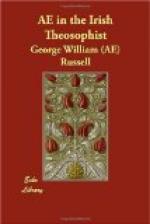It was again the feast of Samhain. About twilight in the evening a shadow darkened the door. A man in blue mantle stood outside; he did not enter but looked around him a little while and then sat down, laughing softly to himself. Fergus, Conail and Lugard rose simultaneously, glad of the pretence of warning off the intruder as a relief from their monotonous watch.
“Do you not know,” said Conail sternly, “that one lies ill here who must not be disturbed?”
The stranger arose.
“I will tell you a tale,” he said. “As I was strolling through the trees I saw a radiance shining around the dun, and I saw one floating in that light like a mighty pillar of fire, or bronze ruddy and golden: a child of the Sun he seemed; the living fires curled about him and rayed from his head. He looked to the north and to the west, to the south and to the east, and over all Eri he shot his fiery breaths rainbow-colored, and the dark grew light before him where he gazed. Indeed if he who lies here were well he would be mightiest among your warriors. But I think that now he clasps hands with the heroes of the Sidhe as well, and with Druid power protects the Ultonians. I feel happy to be beside him.”
“It is Lu Lamfada guarding the hero. Now his destiny will draw nigh to him again,” thought Cu’s companions, and they welcomed the stranger.
“I see why he lies here so still,” he continued, his voice strange like one who is inspired while he speaks. “The Sidhe looked out from their mountains. They saw a hero asleep. They saw a God forgetful. They stirred him to shame by the hands of women. They showed him the past. They said to Fand and Libau, ’Awake him. Bring him to us. Let him come on the night of Samhain.’ They showed the chosen one from afar, in a vision while hid in their mountains. The Tuatha de Danaans, the immortals, wish for Cuchullain to aid them. The daughters of Aed Abrait are their messengers. If Fand and Liban were here they would restore the hero.”
“Who are you?” asked Laeg, who had joined them.
“I am Angus, son of Aed Abrait.” While he spoke his form quivered like a smoke, twinkling in misty indistinctness in the blue twilight, and then vanished before their eyes.
“I wonder now,” muttered Laeg to himself, “if he was sent by the Sidhe, or by Liban and Fand only. When one has to deal with women everything is uncertain. Fand trusts more in her beauty to arouse him than in her message. I have seen her shadow twenty times cooing about him. It is all an excuse for love-making with her. It is just like a woman. Anything, however, would be better for him than to lie in bed.” He went off to join the others. Cuchullain was sitting up and was telling the story of what happened last Samhain.
“What should I do?” he asked.
“Go to the wise King,” said Laeg, and so they all advised, for ever since the day when he was crowned, and the Druids had touched him with fire, a light of wisdom shone about Concobar the King.




